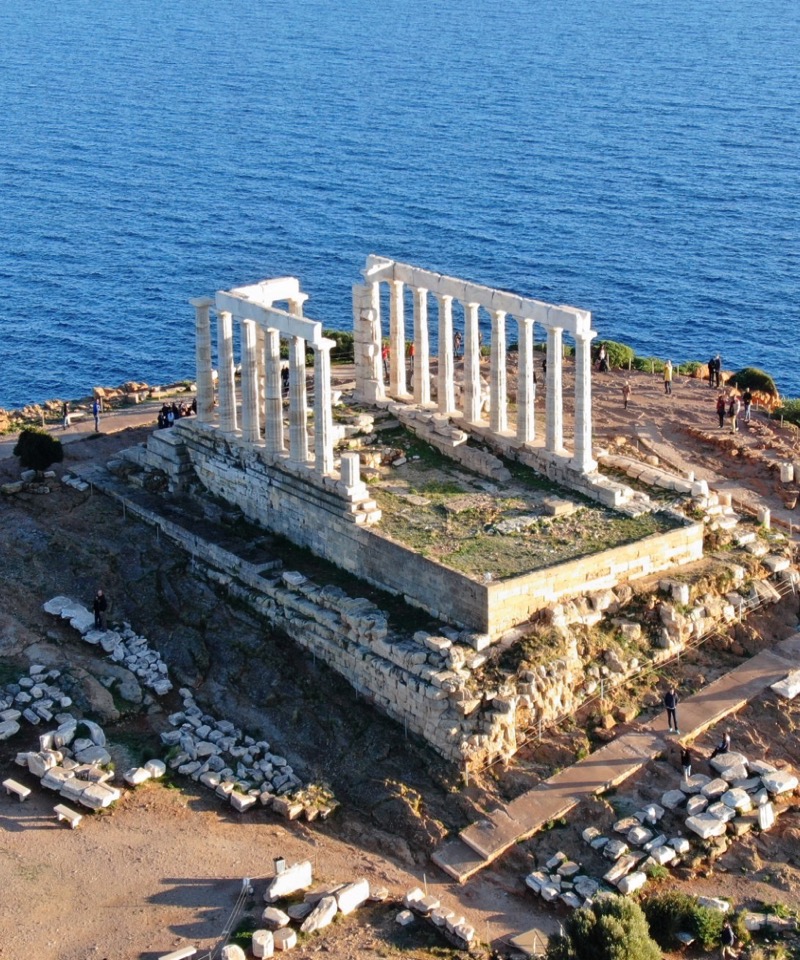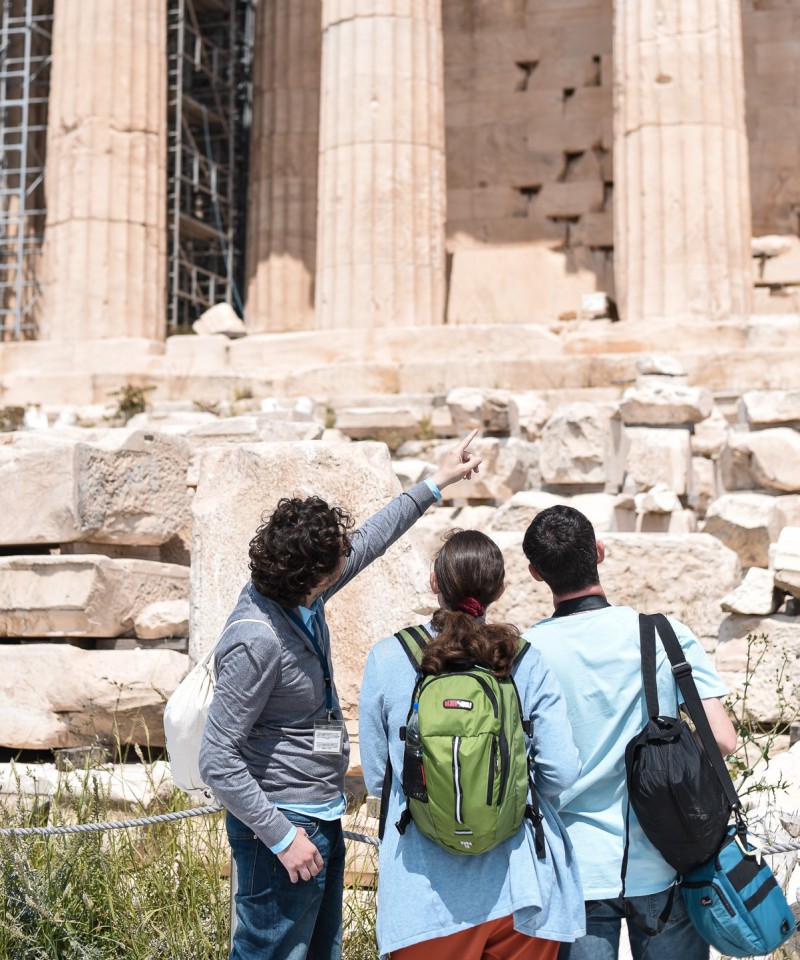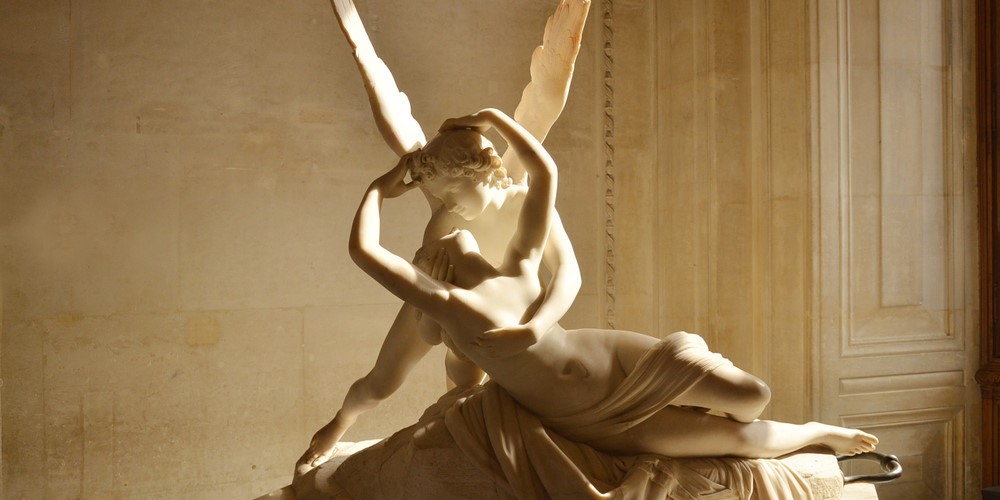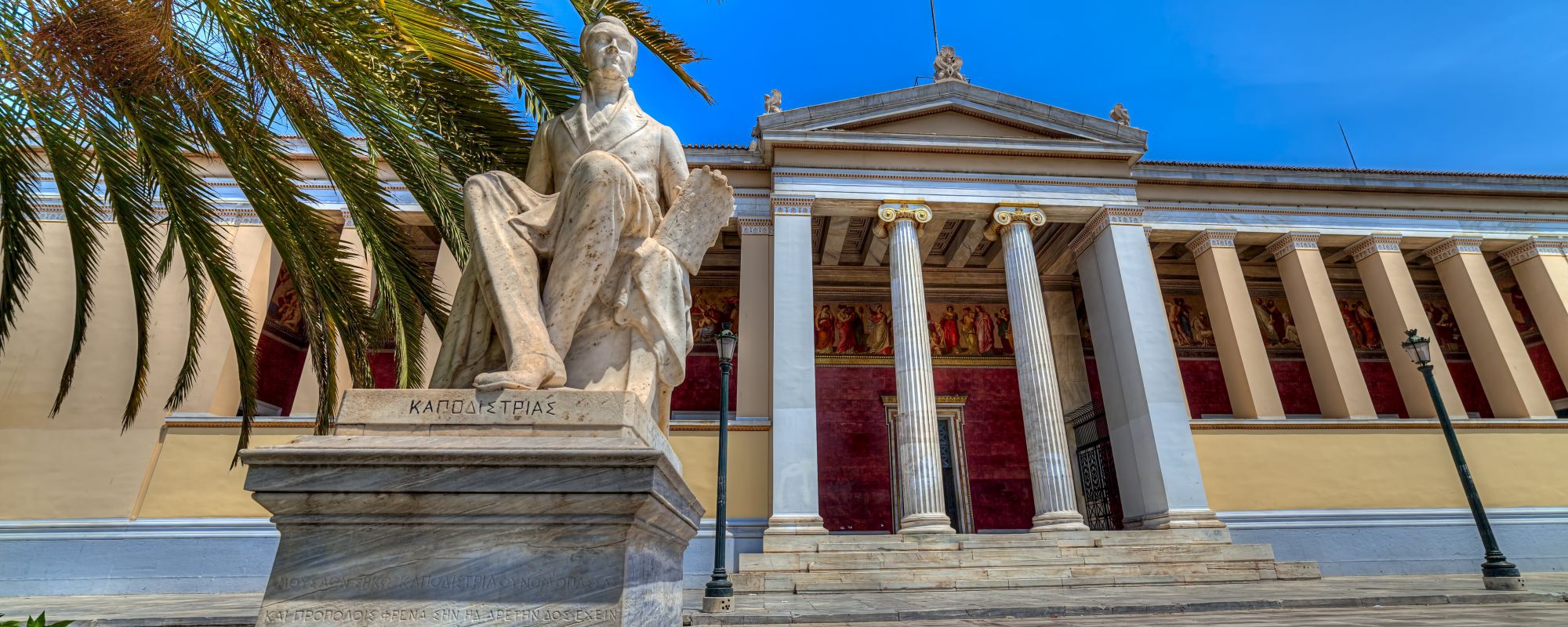
Ancient Greek Philosophers
Key Takeaways
- Greek culture is the number one exportable product of Greece, with Greek philosophy being a significant part of it.
- The ancient Greek philosophers, such as Thales, Socrates, Plato, Aristotle, Heraclitus, Pythagoras, Democritus, Xenophon, Parmenides, and Empedocles, made profound contributions to the world of philosophy, science, and knowledge.
- Philosophy in ancient Greece began with the belief in hidden order and impersonal forces behind natural phenomena, leading to the pursuit of wisdom.
- The ancient Greek philosophers explored various aspects of life, including ethics, politics, cosmology, and the nature of reality, leaving a lasting impact on the world's intellectual heritage.
We may provide the whole world with olive oil, feta cheese, and luscious wine. However, the number one exportable product of Greece is its rich culture, with Greek philosophy being an integral part of it.
With a history that counts thousands of years of age since ancient Greece, the significant personalities that walked the ground of Greece left their mark on the world with their admirable actions, thoughts, and ancient Greek philosophy are more than a few.
Tons of ink has been spent over the centuries analyzing the ideas of ancient Greek philosophers. So how can the most important of them fit in a few lines?
Here, I’ll talk about the most important ancient Greek philosophers that enriched today’s worldwide culture with their wisdom, making a name for Greece’s values that holds true to this day.
The word philosophy, which derives from the junction of the words ‘philos’ and ‘sophia,’ meaning ‘love of wisdom/ pursuit of wisdom,’ appears quite late in the ancient Greek language.
It first appeared sporadically during the 5th century BC, but it was during the time of Plato, at the beginning of the 4th century, that any attempt to determine the exact meaning and scope of its application took place.
Regardless, the general belief, both of the ancient and modern Greeks, is that philosophy was born much earlier, from the beginning of the 6th century, with Aristotle attributing the title of the first philosophers to Thales, Anaximander, and Anaximenes.
Those three philosophers were connected with each other by a relationship of apprenticeship; Anaximander was a student of Thales, and Anaximenes was a student of Anaximander.
Thales
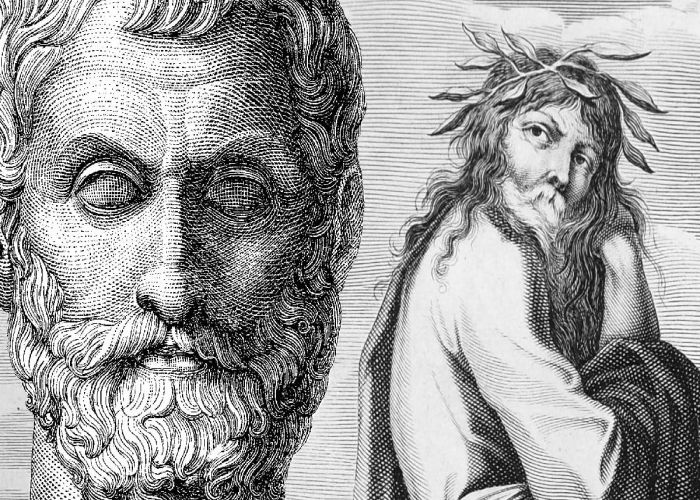
The role of Thales of Miletus in the theoretical revolution seems to be special.
He is the one who, according to Aristotle, ‘founded philosophy’ when he came up with the concept that behind the ever-changing phenomena, there is one ‘beginning,’ a single driving force from which all things come from and end up with their decay. He gave reason to mythological explanations.
According to Thales, who was a pre-Socratic Greek philosopher, this constant, eternal, and unchanging substance is water.
If Aristotle's testimony is correct, then Thales is the first philosopher, as ancient Greek philosophy is born when the belief is created in people's minds that behind the apparent chaos of events, there is a hidden order, a class that comes from impersonal forces. Thales' water is such an impersonal force: it is the first philosophical concept.
Unfortunately, much like the theories of the vast majority of the ancient Greek philosophers, Thales’ thoughts have reached us second-hand.
Texts by Thales himself have not survived or most probably never existed. Therefore, Greeks were later forced to reconstruct their thought based on other sources, which have not always been reliable.
Nevertheless, the Greeks of the 5th century BC considered Thales as a symbol of ingenuity and versatility and is one of the Seven Wise Men of ancient Greece.
Socrates
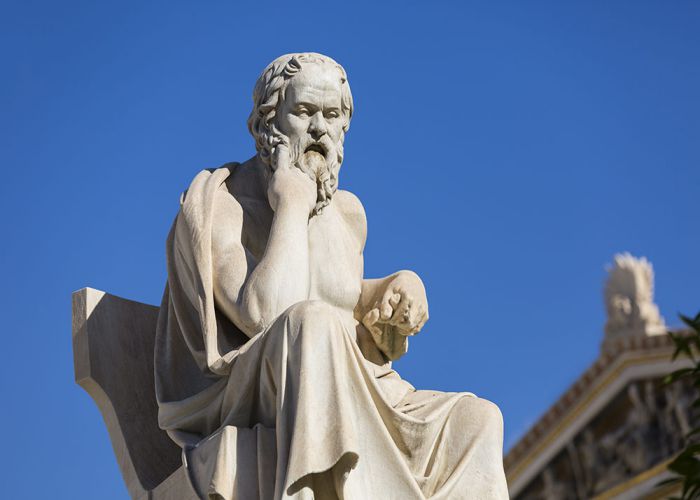
One of the most significant philosophers of Greece, Socrates, was regularly compared to an ‘annoying fly’ among ancient Greeks due to his persistence in provoking ancient Athenians to think and be led to conscious conclusions.
He is most famous for the way he used to come to his deductions, the legendary ‘obstetric method’; through questions seemingly completely unrelated to the topic under discussion, he learned answers that led their interlocutor to the truth.
He is also considered a master of dialectics, as he let his discussers explain their point of view, and then through questions and examples; he showed them the extreme consequences of those who defended them, leading them to revisions and new conclusions.
Although humanity owes him a lot in general, his biggest contribution what that he did not deal with natural phenomena but with the man himself and the concepts of ‘good,’ ‘virtue,’ and ‘thoughtless prejudice,’ coming to humble conclusions, such as his most well-known quote, ‘The only thing I know is that I know nothing.'
He is one of the most important and famous Greek philosophers, something which is apparent from the fact that he created his own school and that the world of philosophy has been divided into pre-Socratic philosophers and post-Socratic philosophers.
The most renowned pre-Socratic philosophers were the three Milesians: Thales, Anaximander, and Anaximenes, who, in fact, founded pre-Socratic philosophy in the 6th century BC.
Plato
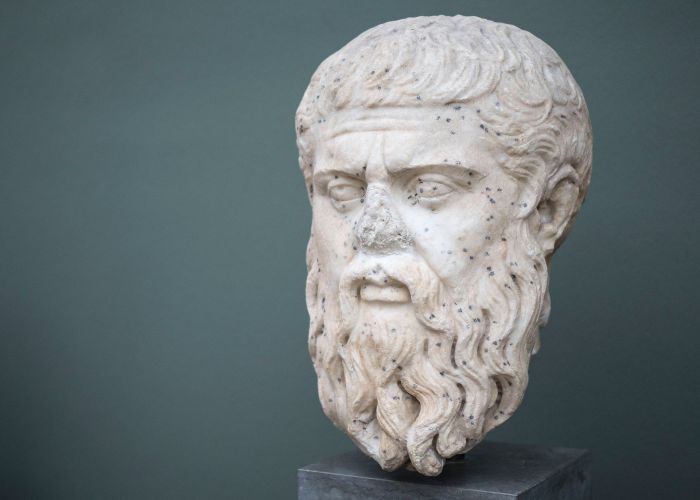
A student of Socrates, and the man through whom his teacher's theories survived, Plato was the first to deal with all the philosophical issues that still concern humanity, from the human soul to divine status and political philosophy. He is known for having the most abstract and absurd philosophical ideas that challenge people's minds to this day.
His greatest work is 'Plato's dialogues' and the famous ‘Politeia,’ the same ideal society of people with a clear separation according to their abilities. His theory challenges democracy, criticizes art, and wants society to take on the task of raising children, abolishing the concept of parenthood.
What’s more, inside the Platonic world, the material world is inferior to ‘ideas.’ In fact, all material objects are mere representations of true ideas.
For instance, inside the world of Plato, the table in front of you is nothing but a representation of the idea of the table; have I destroyed all of your brain cells yet? If not, let me continue.
According to Plato, our soul, when it entered our body, forgot these ideas, which is why the truth is what has been forgotten. With philosophy, Plato argued, one can get closer to the truth!
Aristotle
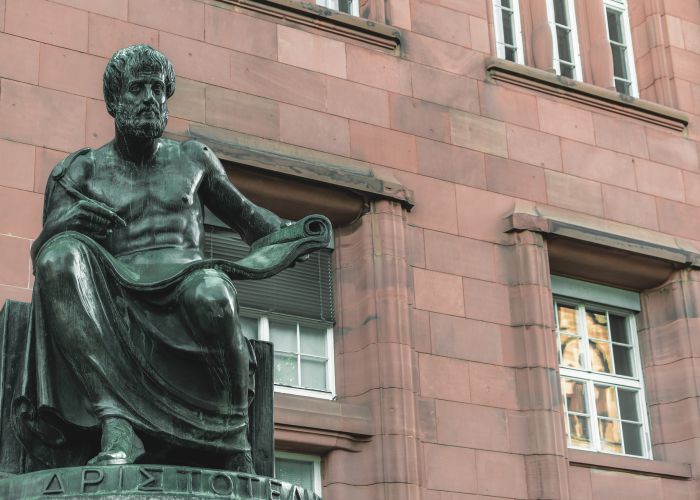
The father of logic and science, Aristotle, was the first to formulate many of what the human mind takes for granted today in western philosophy. He dealt with ethics, politics, and art.
Aristotle rejected Plato's theory. He represented the view of the world with the aim of bliss, which is nothing but life with virtue. The concept of virtue is that which tames passions and mitigates them.
The well-known ‘excellent measure’ of Aristotelian thought considers virtues these qualities found between two extremes. Physical matter and spirit are inextricably linked, while material goods also contribute to happiness as supplements to virtue.
In addition, Aristotle made mention of a kind of god, adding to the four known elements of nature, a fifth: the ‘indestructible ether’ located in the ‘upper place.’ He was also vocal in ancient Greece about issues of moral virtue and the role one plays in society, as he believed that people –well, men at the time- are, by nature, political animals.
Last but not least, it must be mentioned that thanks to him, the foundations of fiction and drama were laid, as his poetry is the only written text with an analysis of tragedy that survived.
Heraclitus
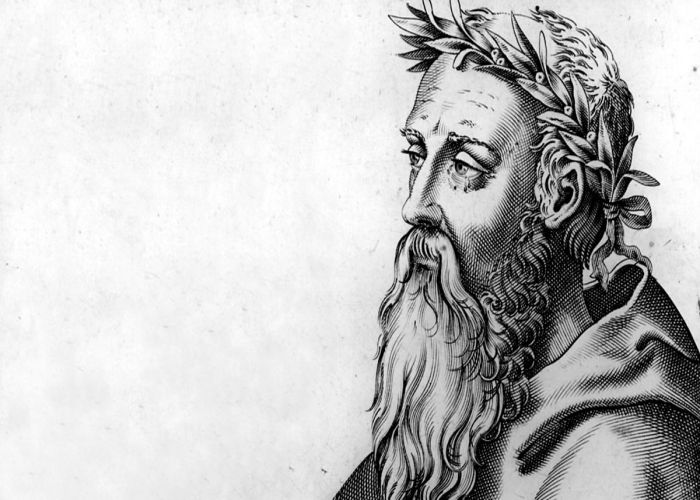
Heraclitus influenced modern thinkers such as Hegel, Nietzsche, and Marx and was one of the first philosophers to approach cosmology. Heraclitus believed that a basic law governed the universe, that of constant change.
He said that 'no one can enter the same river twice,' as this may seem to remain the same, but it is constantly flowing, and the waters are never the same.
He said that the world comes from the element of fire -not in the current sense of the word, but as ‘energy’- and that this fire mutates into the sea, earth, and fire again in a circle; in other words, that everything changes and everything flows.
Opposites connect with each other creating harmony - as he used to say, 'liquids dry out,' and 'cold things heat up'- and vice versa. This harmony is thus achieved through constant conflicts.
Zenon o Eleatis
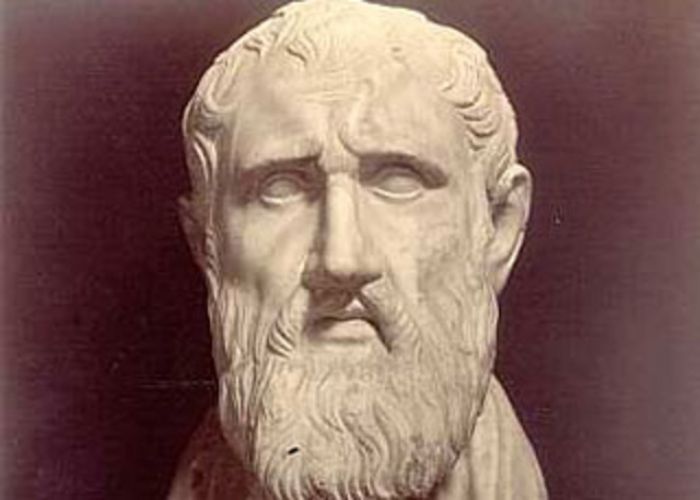
One could say that Zinon o Eleatis was the most pessimistic Greek philosopher of the ancient world. He was definitely no laughing philosopher.
Zenon was devoted to denial and to proving that his opponents were wrong - something that is not entirely useless in human thought. What he became famous for, though, was the way he pushed people to perceive reality: challenging common perception and common sense.
To prove his position, he formulated his famous ‘paradoxes,’ one of which is the paradox of Achilles -a well-known runner of antiquity- and the turtle: If there is a road race between Achilles and a turtle and the turtle starts with a lead of an acre, according to common sense, Achilles will never be able to reach the turtle.
This is because, even if we assume that the runner is 100 times faster than the turtle, then when the runner has gone through an acre, the turtle will have gone through an acre and 1/100 of the stage.
When the runner has passed one acre and one centimeter of the stage, the turtle will have passed one acre, one centimeter, and one centimeter of the stage, and so on.
Pythagoras
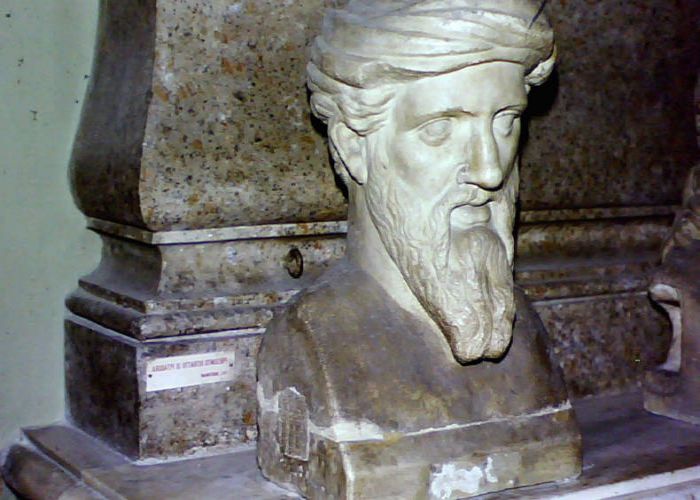
Even if math is not your forte, the Pythagorean theorem is certainly one you remember. Its inspirer, Pythagoras, was an important Greek philosopher, mathematician, geometry, and music theorist that has greatly impacted modern science.
He was primarily the founder of Greek mathematics, created a perfect system for the science of celestial bodies, which he established with all the relevant numerical and geometric proofs, and was the founder of an initiating philosophical movement called Pythagoreanism.
He was a student of Ferekidis while he was in Lesvos and of Anneximandros and Thalis when he went to Miletus. In general, he could be described as one of the most traveled ancient philosophers.
He visited many of the countries of the then-known world in a course of religious-scientific research with the ultimate goal of searching for the ‘Absolute Knowledge’!
He was initiated in all the sanctuaries through which he passed and entered all the sanctuaries since he always became beloved and respected by the priests. Among the areas he visited were Egypt, Persia, Syria, Sparta, Crete, etc.
It is said that he received most of his moral doctrines from Themistocles, who was a priestess of Delphi.
Democritus
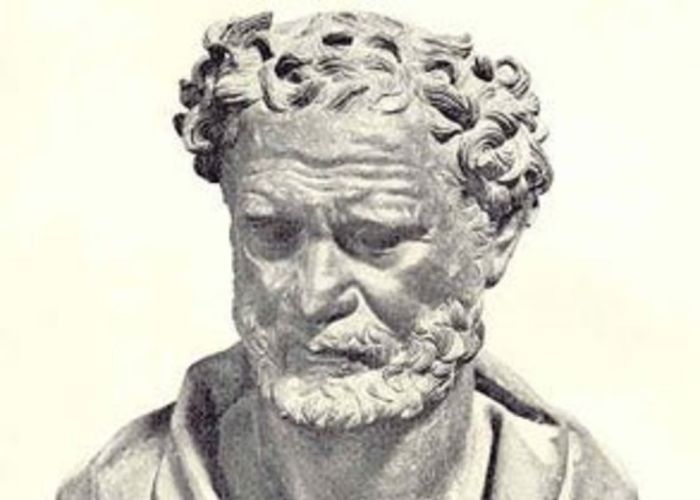
The Greek philosopher Democritus believed knowledge to be of great importance because he believed that man, knowing the causes of various phenomena of the natural world or the nature of things, could better understand the world in which he lives and get rid of the fear of existence.
He advocated that a man with knowledge acquires peace of mind and inner peace, reaching a state that he called ‘happiness.’
The next stage of the human mental state, which has conquered ‘happiness,’ is the stage of ‘immortality’ when people will cease to be amazed and dazzled by what they see that is strange or inexplicable.
The completion of the psychic world takes place, according to Democritus, with the conquest of ‘cheerfulness,’ which meant peace of mind and well-being. Along with knowledge, Democritus gave equally great importance to the joy and enjoyment of life.
He went down in history with the nickname ‘gelastinos,' loosely translated as ‘smiley,’ because he was always smiling and in a good mood. He died at a hundred years of age in 370 BC.
Xenophon
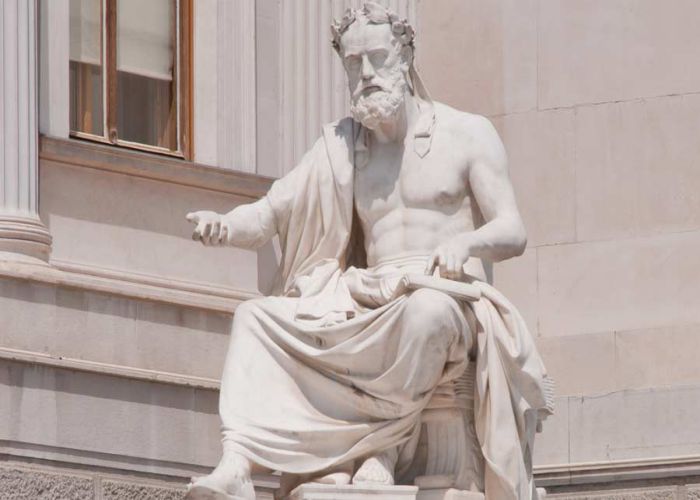
The influence of his teacher, Greek philosopher Socrates, and King Agisilaos was decisive in the work and personality of Xenophon.
In the first, he admired his devotion to the moral values of life, and in the second, his virtues and leadership skills. With an anxious nature and an avid passion for adventure, Xenophon had many varied interests, as evidenced by the content of his surviving work.
Greek philosopher Xenophon was born around 430 BC. in Athens. He was a descendant of a well-to-do family, belonged to the cavalry class, and became a famous ancient historian, philosopher, writer, and general. After the defeat of Cyrus in Kunaxa by Artaxerxes, he led through a thousand adventures and hardships of the myriad Greek mercenaries in Byzantium.
The Athenians exiled him to settle in Corinth. Later, however, he returned to Athens, where he died. His works, products of a demonic spirit and full of high ideals are historical, historical, political, philosophical, and practical.
I can go on and on about the inspiring ancient Greek philosophers and their work. With fascinating lives and even more fascinating minds, they have become an integral part of Greek culture that still manages to blow both locals' and visitors’ minds with their perspicacity and insight.
However, no one can fit the excellence of the ancient Greek philosophers in a single blog post. That’s why I highly suggest you take the time and visit your local bookstore to introduce yourself to at least one of the greatest minds the world has ever since; who doesn’t need at least a pearl of little more wisdom in their lives?
Parmenides
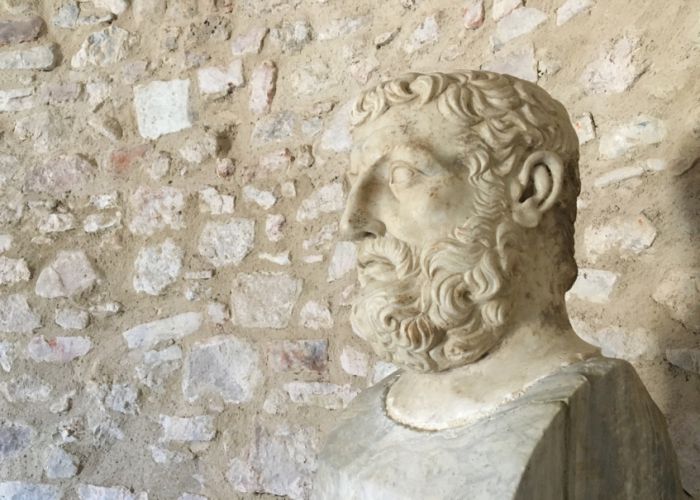
Parmenides is a great ancient Greek philosopher who is considered one of the most profound and challenging thinkers of his time.
As a metaphysical monist, Parmenides introduced the cosmological theory that ‘all is one,' meaning that the multiplicity of existing things, their changing forms, and motion are but an appearance of a single eternal reality, the ‘Being.’
Therefore, all claims of change or of non-Being are illogical, which is the theory behind his famous slogan ‘whatever is, and what is not cannot be.’ In Plato’s dialogue, ‘Parmenides,’ Parmenides and his younger associate, Zeno, talk about his theory with Socrates.
Empedocles
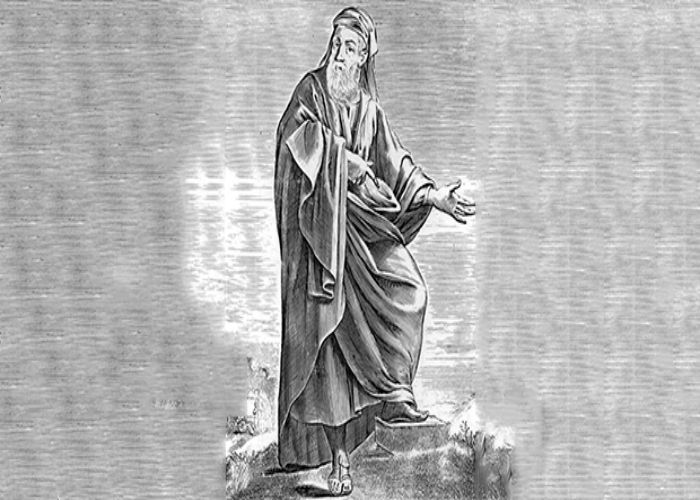
Despite being born in Sicily, this ancient philosopher traveled throughout Greece to study and broaden his mind in order to try to understand the world and its basic principles.
He was considered by Aristotle the inventor of rhetoric, and he’s mostly known for his four elements theory; arguing with Parmenides’ theory, Empedocles claimed that ‘all is composed of the four elements, fire, water, air, and earth.'
He believed that everything in the natural world was composed of these four indestructible and unchangeable elements, even living organisms, and the matter was held together by a fundamental force of the universe he described as Love and pushed apart by another force – Strife.
His natural philosophy influenced heavily Aristotle, who devised and added to it, so it came to be known as the Aristotelian Elements.
Final Thoughts
We can go on and on about the inspiring ancient Greek philosophers and their work that impacted Western philosophy. With fascinating lives and even more fascinating minds, they have become an integral part of Greek culture that still manages to blow both locals' and visitors’ minds with their perspicacity and insight.
However, no one can fit the excellence of the ancient Greek philosophers in a single blog post. That’s why I highly suggest you take the time and visit your local bookstore to introduce yourself to at least one of the greatest Greek minds the world has ever had; who doesn’t need at least a pearl of little more wisdom in their lives?
Travel to Athens, the capital of Greece, where the most important ancient Greek philosophers walked, studied, and preached and where philosophy led to greatness. Visit the Acropolis of Athens on tour and learn everything there is to know about the glorious ancient city, Greek philosophy, and traditional Greek Mythology.
Alternatively, you can opt for one of our Greece vacation packages and broaden your horizon outside Athens; we promise there is a lot more to explore in corners of Greece you would never suspect!





